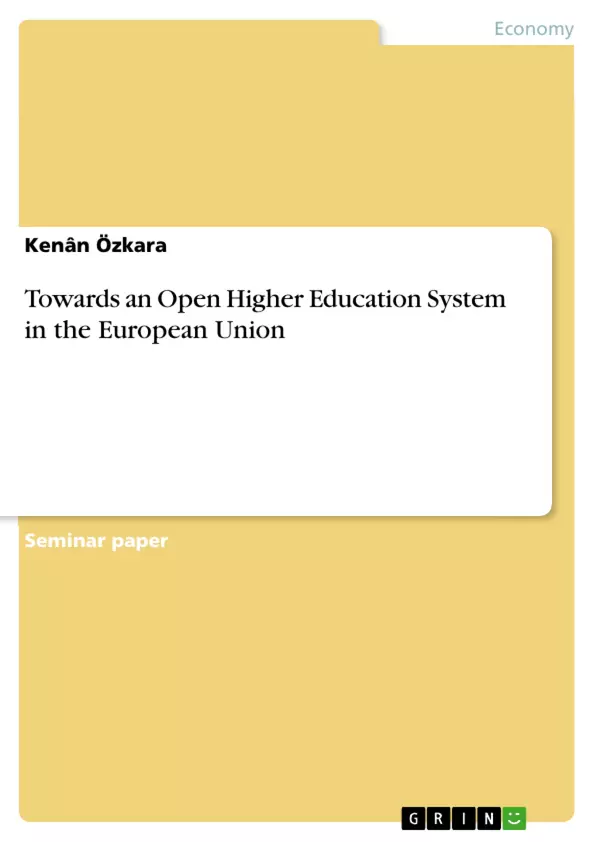Proceeding globalization tendencies and increasing competition on the world markets oblige governments to adapt their educational system permanently to the new global challenges. They have to guarantee that their citizens gain all qualifications that are necessary to cope with recent problems in order to meet the increasing demands of economy. Prospective decision-makers are expected to be highly productive, enormously flexible and very sophisticated in terms of linguistic skills and cultural experiences.
Due to the fact, that hardly any education system has ever been completely shut off from outside influences, the European countries decided to meet their educational mandate jointly. So they intensified collaboration and put it on an institutional level. Soon, this new dimension of cooperation resulted in the creation of a European Higher Education Area (EHEA). Apart from the general intention to push ahead with the integration process, European Education Policy aims at strengthening European economy by promoting employability and mobility of human capital. The European education system and its students are expected to be competitive regarding other education systems in the world as well as regarding common markets.
This paper intends to illuminate some aspects of the European education system. The emphasis is especially put on educational migration within Europe expressed by the SOCRATES respectively ERASMUS program and on the Bologna Declaration as the basis of educational collaboration on an institutional level: At the beginning of chapter two, that deals with educational migration in Europe, the development of the European Education Policy is described in brief. Afterwards the development and the main characteristics and objectives of the SOCRATES / ERASMUS program are presented. The last part focuses on the most important aspects of mobility in general and of the SOCRATES / ERASMUS in particular. Here, the critical analysis is mainly limited to concise economic aspect due to the fact, that a total analysis would go beyond the scope of this paper.
Inhaltsverzeichnis (Table of Contents)
- 1. Introduction
- 2. Educational Migration in Europe
- 2.1. Development of the European Education Policy
- 2.2. SOCRATES / ERASMUS
- 2.2.1. Development
- 2.2.2. Characteristics of ERASMUS
- 2.2.3. Objectives of ERASMUS
- 2.3. Critical Appreciation
- 3. Bologna Declaration
- 3.1. Objectives
- 3.2. Instruments
- 3.3. Acknowledgement of the Bologna Declaration
- 3.3.1. Function of Employability
- 3.3.2. Function of Mobility
- 3.3.3. Labor Market Relevance
- 3.4. Neglected Aspects
- 4. Conclusion
Zielsetzung und Themenschwerpunkte (Objectives and Key Themes)
This research paper aims to explore key aspects of the European education system, particularly focusing on educational migration within Europe and the impact of the Bologna Declaration. The work seeks to analyze the role of exchange programs like SOCRATES/ERASMUS in promoting educational mobility and the implications of the Bologna Declaration for the creation of a European Higher Education Area (EHEA). The paper further investigates the relationship between education, employability, and labor market demands in the European context.
- Educational migration within Europe
- Development of European Education Policy
- The role of SOCRATES/ERASMUS exchange program
- The Bologna Declaration and its impact on the EHEA
- Employability and labor market relevance of higher education in Europe
Zusammenfassung der Kapitel (Chapter Summaries)
Chapter 2 examines educational migration within Europe, tracing the evolution of the European Education Policy and highlighting the key features and objectives of the SOCRATES/ERASMUS program. The chapter provides a critical analysis of the program's impact on mobility and explores the economic implications of educational migration.
Chapter 3 focuses on the Bologna Declaration and its role in shaping the European Higher Education Area. It outlines the objectives and instruments of the Declaration and analyzes its impact on employability, mobility, and labor market integration. The chapter concludes by identifying neglected aspects of the Bologna process.
Schlüsselwörter (Keywords)
The main keywords and focus topics of this paper include: educational migration, European Education Policy, SOCRATES/ERASMUS, Bologna Declaration, European Higher Education Area (EHEA), employability, mobility, labor market relevance, and critical appreciation of education policy.
Frequently Asked Questions
What is the European Higher Education Area (EHEA)?
The EHEA is an institutional collaboration between European countries aimed at creating a more comparable and compatible higher education system across the continent to foster mobility and employability.
How does the ERASMUS program support educational migration?
The SOCRATES/ERASMUS program provides a framework and funding for students to study abroad within Europe, helping them gain cultural experience, linguistic skills, and academic qualifications recognized across borders.
What are the main objectives of the Bologna Declaration?
The Bologna Declaration aims to strengthen the European economy by promoting the mobility of human capital and ensuring that higher education degrees are relevant to the modern labor market.
Why is employability central to European education policy?
Due to globalization and increasing competition, governments need their citizens to be highly productive and flexible. Education systems are adapted to ensure graduates meet the sophisticated demands of the global economy.
What are the challenges of educational migration in Europe?
Key challenges include the economic costs of migration, the need for standardized credit systems (like ECTS), and ensuring that academic credits earned abroad are fully acknowledged in a student's home country.
How does the Bologna process impact labor market relevance?
By standardizing degrees and focusing on practical skills, the Bologna process seeks to make higher education more responsive to the needs of employers and the common European labor market.
- Quote paper
- International Economics M.A. Kenân Özkara (Author), 2004, Towards an Open Higher Education System in the European Union, Munich, GRIN Verlag, https://www.hausarbeiten.de/document/53635


